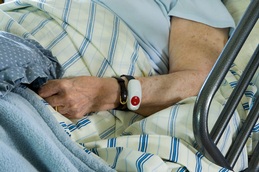New care guidance marks end to use of 'dangerous' and 'humiliating' face-down restrictive intervention

The Government has pledged to reduce the use of ‘outdated’ restrictive interventions in all health and social care settings in new guidance set to help staff avoid the use of physical restraint.
Through a new training programme named Positive and Safe, staff will be supported to end the use of all types of restraint, including physical, chemical, medical or mechanical restraint and seclusion.
The guidance is being published after a Government investigation revealed restraint had been used to abuse patients at Winterbourne View hospital and a study conducted by mental health charity Mind found restraints were being used for too long, and in some circumstances to inflict pain, humiliate or punish people.
Care and Support Minister, Norman Lamb, said: “No-one should ever come to harm in the health or care system. Although it is sometimes necessary to use restraint to stop someone hurting themselves or others, the safety of patients must always come first.
“This new guidance will stop inappropriate use of all types of restraint, reduce this outdated practice and help staff to keep patients safe.”
The Government has pledged £1.2m to fund the training for staff facing challenging behaviour from people they provide care and support to.
The guidance is based on a campaign led by Mind and the Royal College of Nursing which called for the end to dangerous face-down restraint from being used in mental health hospitals, due to the risk of physical and psychological harm to patients and staff alike.
Paul Farmer, chief executive of Mind, said: “We are delighted to support the launch of this important guidance, which marks a significant step towards changing attitudes to restraint and ending face-down restraint.
“We know that healthcare staff do a challenging job and sometimes need to make difficult decisions very quickly. This is comprehensive guidance that looks to address the system as a whole, transforming cultures and attitudes so that difficult situations are less likely to arise and so that staff are supported to use alternatives to restraint when faced with challenging behaviour.
“When someone is in a mental health crisis they need help, not harm. Physical restraint can be humiliating, dangerous and even life-threatening and our own research indicates that some trusts are currently using it too quickly.”
The new guidance will see physical restraint used for the shortest time possible and as a last resort, in situations where someone might be at risk of harming themselves or others around them.
Dr Peter Carter, chief executive of the Royal College of Nursing said: “Nobody wants to see a repetition of the horrific events of Winterbourne View. Nurses have been at the forefront of developing the new approach, which is the result of committed co-operation between professionals, and which makes use of the views of those who have experienced physical intervention.
“This moment is a major step forward in making difficult situations more manageable, and it is at the heart of compassionate care. The Government’s resolve in bringing about this change is to be applauded and the RCN will be working with them to make this approach a reality for all vulnerable people.”
Latest News Analysis
 04-Sep-19
Extra £1.5 billion announced for social care in Chancellor's Spending Review
04-Sep-19
Extra £1.5 billion announced for social care in Chancellor's Spending Review
 02-Jul-19
Department of Health forced to rethink care homes' nursing rates after legal challenge
02-Jul-19
Department of Health forced to rethink care homes' nursing rates after legal challenge
 18-Jun-19
Overnight care workers forced to sleep in offices and told 'bring your own bedding'
18-Jun-19
Overnight care workers forced to sleep in offices and told 'bring your own bedding'
 14-Jun-19
Back in the closet: Third of care home staff have had no LGBT+ awareness training
14-Jun-19
Back in the closet: Third of care home staff have had no LGBT+ awareness training
 11-Jun-19
PM candidates on social care: Rory Stewart calls fixing care an 'unfinished revolution'
11-Jun-19
PM candidates on social care: Rory Stewart calls fixing care an 'unfinished revolution'